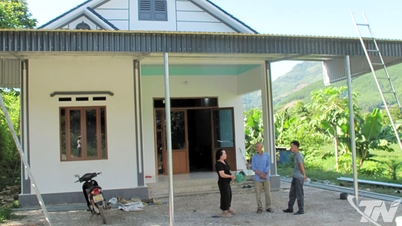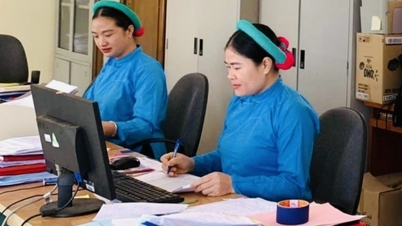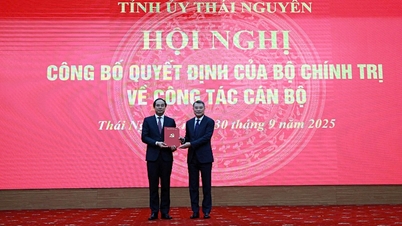Increase in quantity, strong in quality
Due to the specific geographical conditions, culture and educational level, the training of cadres in ethnic minority areas always faces many difficulties and challenges. In order to effectively improve the quality of ethnic minority cadres, Party committees and authorities at all levels have focused on planning and forecasting the source of ethnic minority cadres to have appropriate training, fostering and utilization policies, training content is linked to the reality and requirements of socio -economic development of the ethnic minority areas where cadres work to form a large number of cadres with good expertise.
Currently, the total number of ethnic minority cadres, civil servants and public employees in the province accounts for 42.7%. At the provincial level, there are 1,260 ethnic minority cadres and public employees, accounting for 29.2%; 13 have a PhD, 188 have a Master's degree, and 910 have a Bachelor's degree; 497 have a political theory degree from intermediate level or higher, accounting for 26.12%. At the district level, there are 5,912 ethnic minority cadres, civil servants and public employees, accounting for 44.2%. Of which, 1 has a PhD, 77 have a Master's degree, and 3,536 have a Bachelor's degree; 2,210 have a political theory degree from intermediate level or higher, accounting for 37.4%.
Officials of the Women's Union of Minh Huong commune (Ham Yen) discuss professional work of the union.
At the commune level, there are 1,547 ethnic minority officials and civil servants, accounting for 57%. Of these, 17 have a university degree or higher, 1,400 have a university degree, and 126 have a degree below university level; 1,428 have a political theory degree from intermediate level or higher, accounting for 92.3%.
The above figures show that the quality of ethnic minority cadres in the province has changed positively. This is an important result of the province after many years of implementing solutions to improve the quality of human resources, including ethnic minority human resources. Many ethnic minority cadres have successfully completed the courses and become competent leaders in the locality.
Currently, the number of ethnic minority cadres holding positions under the management of the Provincial Party Committee Standing Committee accounts for 35.9%; participating in provincial Party Committees accounts for 41.67%; participating in provincial People's Councils accounts for 54.55%. The number of ethnic minority cadres holding positions under the management of district Party Committee Standing Committees accounts for 35.28%; participating in district Party Committees accounts for 31.07%; participating in district People's Councils accounts for 59.52%.
Priority training for ethnic minority cadres
To carry out this task, since the previous term, the Provincial People's Committee has issued Plan No. 102/KH-UBND on promoting the development of ethnic minority human resources in the period of 2016 - 2020, with a vision to 2030 in the province. In particular, focusing on the work of building, training, fostering, and using ethnic minority cadres; implementing preferential policies for ethnic minority cadres working in mountainous, remote and isolated areas; paying attention to the arrangement, selection, appointment, nomination, transfer and rotation of ethnic minority cadres and key cadres at the commune level...
From 2019 to present, on average, each year, the provincial agencies and units have sent 7,362 ethnic minority cadres, civil servants and public employees to training and fostering to improve their political theory and professional qualifications according to job positions and job titles. The province has provided support to attract 228 civil servants and public employees, including 100 ethnic minority cadres and public employees; and supported postgraduate training for 118 cadres, civil servants and public employees, including 49 ethnic minority cadres, civil servants and public employees.
For localities, there are also solutions to prioritize ethnic minority cadres in terms of training, fostering, and planning. Na Hang district strives that by 2025, 100% of commune-level cadres and civil servants will have university degrees or higher, and over 90% will be party members with intermediate political theory degrees or higher. The Standing Committee of the District Party Committee directs units and localities to proactively manage, arrange, use, train, foster, plan, and rotate cadres.
Lam Binh district has built a team of qualified cadres to meet the requirements of the task, with over 90% of the cadres being ethnic minorities. Right from the beginning of the 2020 - 2025 term, the district has had a policy of encouraging, creating conditions and sending cadres, civil servants and public employees of agencies and units to attend training, fostering, improving capacity, professional qualifications, skills, political theory, etc. Since the beginning of the term, the district has sent nearly 300 cadres to attend training to improve their qualifications, professional qualifications and skills. The district has also planned 208 district-level cadres and 196 grassroots-level cadres.
To continue to effectively improve the quality of ethnic minority cadres, in 2023, the Provincial Party Standing Committee issued Project No. 15-DA/TU on building a team of young cadres, female cadres, and cadres of ethnic minorities in Tuyen Quang province, period 2023 - 2030. In particular, the target for the 2025 - 2030 term is that the proportion of ethnic minority cadres participating in provincial Party Committee members is 45% or more; district level is 40% or more, commune level is 55% or more. Along with that, the Project proposes synchronous solutions in training and fostering ethnic minority cadres.
The work of training, fostering and promoting the role of ethnic minority cadres is a regular, continuous and long-term process. Training ethnic minority cadres is not only an immediate task but also a long-term strategy, contributing to the comprehensive development of the province.
Source: https://baotuyenquang.com.vn/nang-cao-chat-luong-doi-ngu-can-bo-dan-toc-thieu-so-196941.html




![[Photo] General Secretary To Lam, Secretary of the Central Military Commission attends the 12th Party Congress of the Army](https://vphoto.vietnam.vn/thumb/1200x675/vietnam/resource/IMAGE/2025/9/30/9b63aaa37ddb472ead84e3870a8ae825)
![[Photo] Solemn opening of the 12th Military Party Congress for the 2025-2030 term](https://vphoto.vietnam.vn/thumb/1200x675/vietnam/resource/IMAGE/2025/9/30/2cd383b3130d41a1a4b5ace0d5eb989d)
![[Photo] The 1st Congress of Phu Tho Provincial Party Committee, term 2025-2030](https://vphoto.vietnam.vn/thumb/1200x675/vietnam/resource/IMAGE/2025/9/30/1507da06216649bba8a1ce6251816820)
![[Photo] President Luong Cuong receives President of the Cuban National Assembly Esteban Lazo Hernandez](https://vphoto.vietnam.vn/thumb/1200x675/vietnam/resource/IMAGE/2025/9/30/4d38932911c24f6ea1936252bd5427fa)
![[Photo] Panorama of the cable-stayed bridge, the final bottleneck of the Ben Luc-Long Thanh expressway](https://vphoto.vietnam.vn/thumb/1200x675/vietnam/resource/IMAGE/2025/9/30/391fdf21025541d6b2f092e49a17243f)


































































































Comment (0)